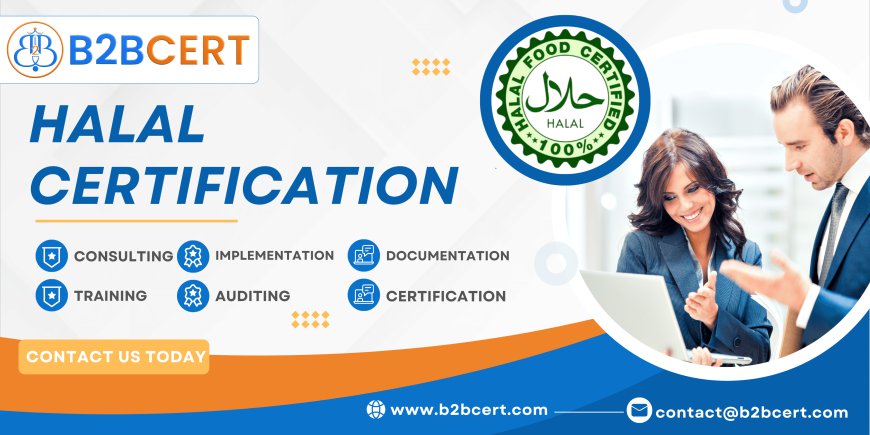HALAL Certification in Saudi Arabia: Ensuring Compliance with Islamic Standards
Halal certification in Saudi Arabia is more than a regulatory requirement—it is a vital tool for businesses aiming to succeed in the Kingdom's dynamic market. With strict compliance to Shariah principles, the certification process ensures that products meet the highest standards of quality and integrity.

HALAL Certification in Saudi Arabia plays a crucial role in ensuring that food, beverages, cosmetics, pharmaceuticals, and other products comply with Islamic law (Shariah). The term “halal,” meaning “permissible” in Arabic, is used to describe products that adhere to the ethical, dietary, and hygienic standards set forth in Islam. As the birthplace of Islam and home to the two holiest cities of Mecca and Medina, Saudi Arabia is a key player in the global halal industry. For both local and international businesses, obtaining halal certification is essential to enter the Saudi market and meet the demands of Muslim consumers.
The Importance of Halal Certification
Halal certification is not just about ensuring the dietary permissibility of food items but also encompasses various industries that provide goods and services used by Muslims. These include everything from cosmetics, toiletries, and pharmaceuticals, to cleaning products and even finance. With a significant Muslim population and the Kingdom’s global influence, Saudi Arabia sets the standard for halal certification worldwide.
For companies, obtaining halal certification is not only about compliance but also about establishing trust with Muslim consumers. Halal-certified products are perceived as safer, more ethical, and of higher quality, as they meet specific criteria that guarantee their adherence to Islamic laws. This certification assures customers that the product does not contain ingredients prohibited by Islam, such as pork or alcohol, and that it has been prepared or manufactured according to halal principles.
Regulatory Authorities and Certification Bodies
In Saudi Arabia, halal certification is primarily regulated by the Saudi Food and Drug Authority (SFDA). The SFDA oversees the certification process for food, beverages, and pharmaceuticals, ensuring they meet strict health and safety standards. The authority also plays an important role in setting guidelines for halal product labeling, which is critical in providing transparency for consumers.
In addition to the SFDA, various other governmental bodies and private organizations issue halal certifications, including the Saudi Standards, Metrology and Quality Organization (SASO). These agencies are responsible for verifying that products meet the necessary halal standards and are consistent with Islamic teachings. International halal certification bodies also work with these organizations to ensure that globally produced products comply with the relevant regulations before being sold in Saudi Arabia.
The Halal Certification Process
The process of obtaining halal certification in Saudi Arabia can be intricate, but it ensures that all products meet the standards set by Shariah law. Businesses seeking certification must apply through an accredited certification body that will thoroughly inspect their production facilities, raw materials, processes, and ingredients. The application process generally involves the following steps:
-
Application Submission: Companies must submit a detailed application outlining their product or service, ingredients, production methods, and sources.
-
Document Review: The certification body reviews all submitted documents to ensure compliance with Islamic dietary laws and regulations.
-
Site Inspection: Certification bodies may conduct on-site inspections of manufacturing facilities to verify the cleanliness, hygiene, and halal compliance of production processes.
-
Testing: If necessary, the product undergoes laboratory testing to check for prohibited ingredients, such as traces of pork, alcohol, or other non-halal substances.
-
Approval and Certification: Once the certification body is satisfied that the product complies with all halal standards, a halal certificate is issued.
The certification is typically valid for one year, and businesses are required to undergo re-evaluations to maintain their halal status.
The Role of Halal Certification in Saudi Arabia’s Economy
Saudi Arabia’s economy is closely linked to its religious and cultural identity. As one of the largest markets for halal products in the world, Saudi Arabia continues to drive the global demand for halal-certified goods. The Kingdom is home to over 34 million people, with a growing number of foreign residents and millions of Muslims visiting for the Hajj pilgrimage each year. This creates a substantial market for halal products, making certification an essential requirement for both domestic and international companies seeking to enter this lucrative market.
Saudi Arabia’s position as a leader in the halal sector also contributes to its economic diversification efforts. As the country moves away from oil dependency under its Vision 2030 program, the development of the halal economy is seen as a strategic opportunity to expand in global markets. The halal industry includes not only food products but also pharmaceuticals, personal care, and lifestyle products, all of which require HALAL Services in Saudi Arabia for consumer trust and market acceptance.
Challenges and Opportunities
While the demand for halal products in Saudi Arabia continues to grow, there are several challenges in the certification process. Businesses, especially international ones, often face complexities due to varying interpretations of halal standards, differing certification requirements in different countries, and the cost of compliance. However, these challenges also present significant opportunities for businesses that can navigate the halal certification process effectively.
For international companies, obtaining halal certification in Saudi Arabia can open doors to the broader Middle Eastern and Muslim-majority markets. The Kingdom’s halal certification is widely recognized, and products bearing the SFDA or SASO halal logos are trusted by consumers across the globe.
Conclusion
HALAL Consultants in Saudi Arabia is more than a regulatory requirement—it is a vital tool for businesses aiming to succeed in the Kingdom's dynamic market. With strict compliance to Shariah principles, the certification process ensures that products meet the highest standards of quality and integrity. For companies both in Saudi Arabia and around the world, obtaining halal certification not only meets legal requirements but also builds consumer confidence, boosts business growth, and contributes to the flourishing halal industry worldwide.
